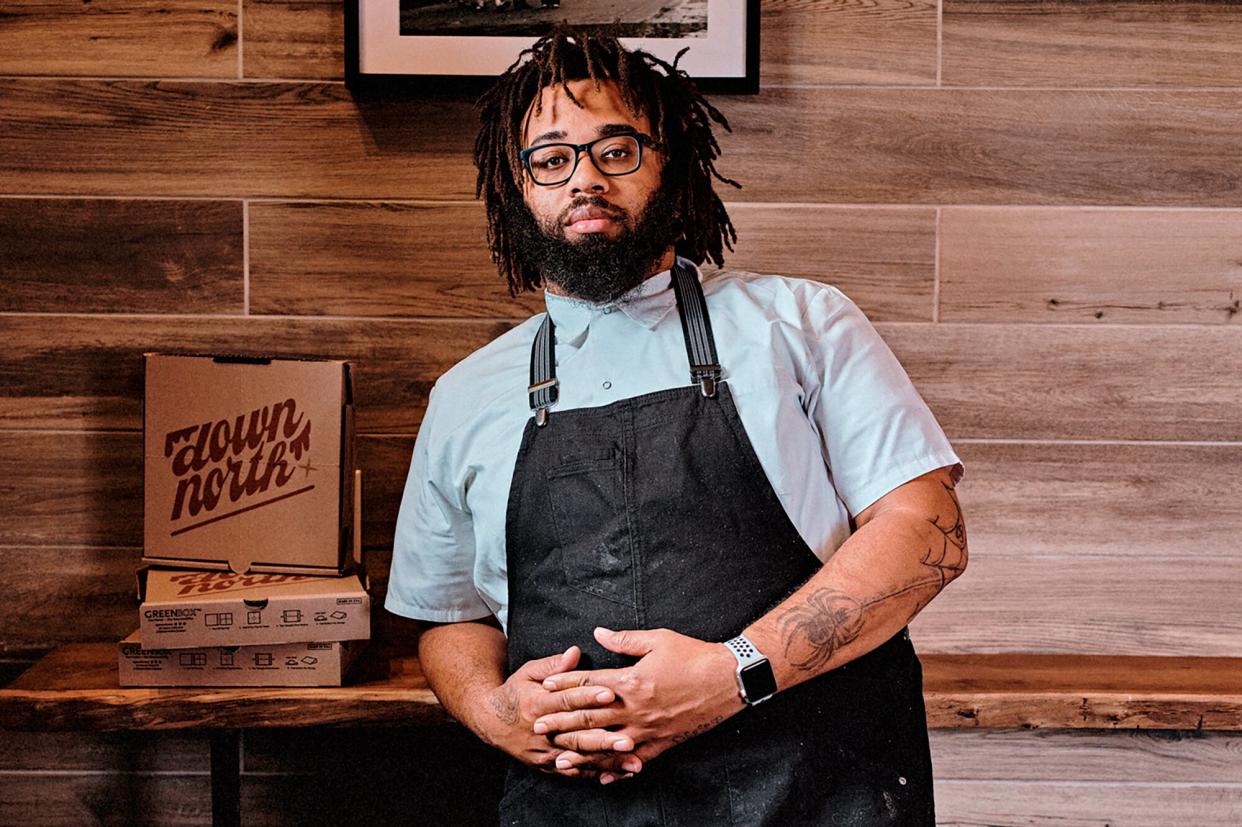Kurt Evans Praises Black Heritage Cooking, Fights Mass Incarceration—One Plate and Pizza at a Time

Courtesy of Kurt Evans
For Kurt Evans, chefs are akin to first responders who meet an urgent social need to make an impact. In his case, that need is decarceration in the United States. "I have experienced mass incarceration through friends and family members," he says; his mission is to positively impact returning citizens.
Evans grew up in Philadelphia, shadowing his grandmother in the kitchen. "She would say, 'I'm going to show you how to make this once, so you better get it,'" he says with a laugh. Needless to say, he did. From an early career start alongside Robert and Benjamin Bynum, whom Evans praises as the longest-tenured Black restaurateurs in Philly, Evans has become an authority in what he calls Black heritage cooking. He makes a mean fish and grits, but what he values most are the sociopolitical undertones innate to serving and sharing food.
RELATED: Kurt Evans Is Cooking to End Mass Incarceration
"Black people, we've always strategized over food," he explains. "Slaves plotted their escape over meals. Georgia Gilmore literally sold platters out of her home to bail people out of jail during the bus boycott movements. Leah Chase fed everyone from Martin Luther King Jr. to Barack Obama."
Inspired by the dinners South Philly Barbacoa's Cristina Martinez and Benjamin Miller hosted that centered around the challenges facing undocumented workers, Evans built his own series called End Mass Incarceration. His first dinner took place in Philadelphia on January 13, 2018, and brought together formerly incarcerated speakers with the likes of Nina Ahmad, who was running for auditor general at the time. Having individuals present who were candidates for office—people who could enact policy that might positively impact those inside—created a setting where district attorneys might find themselves passing beans to kids straight out of Rikers.
RELATED: This Culinary School Teaches Formerly Incarcerated People Knife Skills and Life Skills
While the dinner series aims to bridge the social and educational gap between the formerly incarcerated and those distanced from the system, Evans also wanted to build something to directly employ returning citizens. "I bought into a restaurant called Route 23 in Philly, and I remember one day, three employees were visited by their parole officers. I thought, 'This is such a simple way to help … If we don't hire them, who will?'"
In March 2021, Evans opened Down North Pizza in North Philadelphia, a restaurant wherein all eight employees are formerly incarcerated. "The food industry has never had a problem hiring formerly incarcerated people. The problem is employers threatening to call parole officers and dehumanizing these guys," Evans says. At Down North, employees are paid above minimum wage, tips are pooled, and the team avoids traditional titles to eliminate any hierarchy.
RELATED: Black Communities Have Always Used Food as Protest
Evans is now in the process of signing over his ownership interests to Down North's employees—it's on to the next endeavor. One is an extension of Everybody Eats, the nonprofit he cofounded during the COVID-19 pandemic. At the time, some neighborhoods were witnessing what he called a "food apartheid" because of vandalism resulting from unrest following George Floyd's murder. "We delivered over 1,200 chef-prepared meals," he says. Now, they're building a new arm. "When Bobby Seale ran for mayor in Oakland in '73, he would give out produce and canned goods to get individuals registered to vote." This year, Everybody Eats will launch a food truck where Evans and his partners will be giving out produce to Philadelphia residents.
"Everybody's using the word 'reimagining,' but nobody's really reimagining anything," he says. A world with more of Evans' food and fewer people in prison certainly sounds like a future to get behind.
Pitch In
Support Kurt Evans' work via Everybody Eats at everybodyeatsphilly.org/donate.

